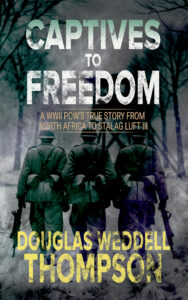An inspiring testament to the generosity of the human spirit amidst the rigours of imprisonment and mortal danger.
A review of Captives to Freedom written by Douglas Thompson
 This is not a traditional tale of cruel captivity and heroic escape, like many accounts of World War II imprisonment. The beginning of Captives to Freedom is action-packed, as Thompson’s unit in the Middle East desert is overwhelmed by Rommel’s superior force and is captured or killed. In the end, the waning days of the war are a frenetic forced march of POWs as rattled German guards try to outrun advancing British troops.
This is not a traditional tale of cruel captivity and heroic escape, like many accounts of World War II imprisonment. The beginning of Captives to Freedom is action-packed, as Thompson’s unit in the Middle East desert is overwhelmed by Rommel’s superior force and is captured or killed. In the end, the waning days of the war are a frenetic forced march of POWs as rattled German guards try to outrun advancing British troops.
However, the bulk of the account, spanning four years of captivity in camps in the Middle East, Italy, and then Germany, is a tale of resourcefulness in attending to the quieter needs of the human mind, heart, and soul. What amazed me was Thompson’s infinite curiosity about his fellow prisoners and his commitment to his Methodist mission of providing pastoral care to whoever was in front of him, whether through psychological counselling, physical care, intellectual education, or spiritual nurturing.
Disclaimer: I’m a secular Jew whose experience of missionaries was saying no to door-knocking evangelists to conversion, with the threats of an eternity in hell, my refusal implied. But writing my own World War II novel, Beyond the Bukubuk Tree, set in Papua New Guinea, brought me a more positive view of missionary work. I truly admire Thompson.
Like John McCain, Thompson was offered early repatriation but refused. He stayed with his community, where he saw the greater need to grow as full human beings in captivity and prepare to make unique contributions to a post-war world. Sentences like “A sensitive, younger man, as naked to pain as a daisy to light” show his individualized perceptions of people that never got jaded, despite hunger, paralytic cold, bed bugs and occasional unnecessary killings by guards.
It’s unclear how often POWs had a working secret radio, but this is how Thompson recounts Allied progress: “Italian officers playing football with Mussolini’s portrait told us of the fall of fascism.” Released by British troops in 1945, he describes his reaction with startling nuance. “I had entered a foreign world. They were high with excitement and victory. I somehow shared the German defeat and discovered my heart of the farmers on whose land I had slept than to my own folk,” As an officer, he was treated according to the Geneva Conventions. He wasn’t exposed to the worst Nazi depravities. Still, he suffered a lot. How did he grow so resourceful?
Over the 15 years he spent in China from 1925 to 1939, he walked through various and changing circuits. He taught Chinese literacy to villagers, trained health and hygiene workers, supplied medicines, and created a credit co-op for tenant farmers to free them from the usurious absentee landlords who kept them in perpetual, unpayable debt. Serenely focused, he tip-toed around warlords, braved roads dominated by bandits, navigated between warring Communists and Nationalists, and endured Japanese bombings. His love for China and the Chinese language, along with his faith, sustained him. When he became an army chaplain, he was familiar with modern and guerrilla warfare, as well as the full range of human capabilities. I recommend Captives to Freedom to readers eager for a saga of captivity that transcends one-dimensional adventurism and clear delineations of good versus evil.


